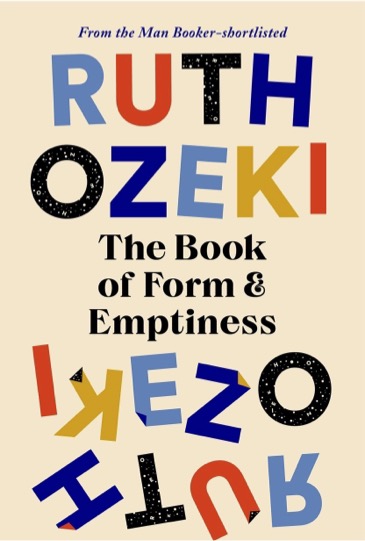Ruth Ozeki’s The Book of Form and Emptiness (Canongate, 2021) won the 2022 Women’s Prize for Fiction. It tells the story of Benny Oh, a teenager who is negotiating the untimely death of his father, Kenji, and Annabelle, Benny’s mother, who is additionally struggling with her own health and hoarding habits.
Benji also hears voices, either in a psycho-clinical way, or in a magical realist way (the book leaves it up to the reader to decide). In either case, the novel is a comic coming-of-age tale that also addresses hyphenated ethnic identities (Kenji is Korean–Japenese, making Benny Korean–Japenese–American), and consumer capitalism. Regarding the latter, there are a lot of things stuffing this book.
Clearly, this book is a critical success, with a £30,000 award from the Women’s Prize lining Ozeki’s pockets when she travelled back to the US. And yet, a cursory glance at some reviews suggests that it has not been universally well received by readers. I take a look at three of them here to see what we can learn about reviews and about reading to help others.
First, a positive review in the Guardian from author M John Harrison, which finishes with the following:
At base, this is a simple story about the links between poverty, mental health and loss. It’s often heartbreaking, but we would be wrong to interpret Annabelle and Benny’s struggles as a descent. Ozeki is carefully celebrating difference, not patronising dysfunction. Out of their fractured relations, she makes something so satisfying that it gave me the sense of being addressed not by an author but by a world, one that doesn’t quite exist yet, except in tenuous parallel to ours: a world built out of ideas that spill into the text like a continuous real-time event. The voice of a commentary on the present – or of the commentary of the present upon itself.
M. John Harrison, para. 8, Guardian, 6 October 2021
Next, a more critical review from Judith Shulevitz in the New York Times:
I do have nits to pick, though. Like Annabelle’s house, the novel is overstuffed. I could complain about the excess of plot twists and the extraneous characters, like the female Zen priest who’s written the best-selling anticlutter guide that follows Annabelle around the house despite her attempts to misplace it. Both guide and priest feel like dei ex machina come to clean up the messes our characters get into. The more interesting aggravation, however, is the novel’s framing device — that is to say, the Book as both narrator and character. The conceit is grating. The Book has a bad habit of Book-splaining.
Judith Shulevitz, para. 8, New York Times, 19 September 2021
And, finally, the opening to Allan Massie’s review in the Scotsman:
There are a great many such sentences in this fat, over-stuffed novel, and it leads this reviewer at least to sigh for the days when strong-minded editors were more important in publishing houses than the marketing department. The blue pencil would have come out, underlining a sentence or indeed paragraph and scribbling ‘self-indulgent’ in the margin. There aren’t many of Ozeki’s pages that would have escaped the blue pencil.
Allan Massie, para. 1, Scotsman, 20 September 2021
Each of the reviews stresses the stuffed characteristic of the prose and the story: this is a book full of things, as I have already said. Whether they are ‘spill[ing]’ in Harrison’s phrase, or ‘overstuffed’ in both Massie’s and Shulevitz, each of the reviewers can agree on this.
How, then, do we account for the different reactions to the fullness on offer in The Book of Form and Emptiness? Is it purely a subject response to the style of writing? Massie’s interest in editing fiction (whether as professional experience, or as a reader) is clearly at the forefront in his reading, but we can’t necessarily apply that evenly to all the reviewers here.
I’ve not read any fiction by Harrison or Shulevitz, so I can’t comment on the similarities or dissonances between their own writing and Ozeki’s. Nevertheless, that might be an avenue worth pursuing.
In these reviews there is also a shared emphasis on the idea of the sentience of the Book, who carries the narratorial burden in Ozeki’s novel. For Shulevitz this is ‘grating’ and ‘aggravating’. In another passage, Massie describes this aspect of the novel as ‘flapdoodle, the sort of thing that means nothing at first reading and nothing at any subsequent one’ (para. 4).
Given that this is a central conceit of the novel—the sentience of the Thing and postmodernist play that involves us as reader of and Benny as interlocutor with the Book—the rejection of this aspect of Ozeki’s framing must also be a dismissal as a whole of The Book of Form and Emptiness.
In a few lines, a review can undermine an entire work of art.
To an extent, none of this matters: Ozeki still went on to win the prestigious Women’s Prize, despite these reviews.
And yet, as I have written in Judge for Yourself, reviews often furnish readers with their first opinions on a text, which may then shape their reading experience. As such, ‘whilst there is no critical consensus for hyper-contemporary writing, the reviews often provide the reader’s first engagement with others’ opinions on a text—either the reason for buying the book or to check the reader’s opinion in comparison with someone else’s’.[1]
Do these reviews then establish a scepticism—healthy or not—regarding prize winners? Do readers of these novels, such as Ozeki’s, consider them imperfect and unworthy of prizes they go on to win?
I am about to take a seminar on Ozeki’s The Book of Form and Emptiness with my final-year students, and I am certain that the issues raised in these reviews will form part of the discussion. Whether rightly or wrongly, the reviewers’ initial responses to the novel will shape our first engagements with the book, and (to a certain extent) limit the scope of our conversations.
Thus ends the transient nature of the hyper-contemporary text, the fleeting moment of its unshaped reception.
[1] Nicholas Taylor-Collins, Judge for Yourself (London: Routledge, 2020), p. 20.


Leave a Reply